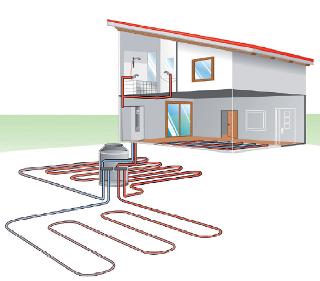Heat pump, the most efficient heating
Millions of consumers in Europe use gas boilers to heat their homes, which are polluting and depend on an energy with large ups and downs in price, forcing us to rethink its use. Consumers who are going to install or change their heating system wonder what will be the most affordable alternative to sustainably heat their homes in the near future. What solutions should the next EU and national rules promote?
To answer these questions, OCU together with BEUC and consumer organizations from Italy (Altroconsumo), Czech Republic (dTest) and Poland (Federacja Konsumentow) have calculated the cost of heating with electric heat pumps, hybrid heat pumps electric-hydrogen and hydrogen boilers. It has been chosen to study the period 2025-2040 because it is for which the European legislation is being reviewed and taking into account that the average life of the devices is between 15 and 20 years.
The cost of heating has been calculated for a single-family home and an apartment, taking into account the purchase and installation of the devices, the cost of the energy they use (what it costs to generate it and the investments in the networks that transport, because everything influences the bill) and the insulation of the buildings.
Heat pumps, the most affordable option
The study reaches five main conclusions, which legislators should take into account in their future discussions.
- Electric heat pumps are the most economical option for consumers to decarbonize their heating: they are 30% cheaper than the hybrid hydrogen/electric solution and almost 60% cheaper than the hydrogen boilerIn highly populated areas Like big cities, a district heating system powered by heat pumps would also be competitive. Hydrogen boilers and hybrid (hydrogen/electric) heat pumps are the most expensive option for consumers. In fact, hydrogen delivered through conventional natural gas networks will prove more expensive to consumers than gas.
- In cold climates, home energy efficiency improvements bring significant economic benefits to consumers, reducing consumption and CO2 emissions. In hot climates, shading (for example, putting up blinds) can reduce consumption and improve comfort.
- "Smart heating" that switches on when energy is cheaper at off-peak hours would reduce consumers heating costs up to 25% compared to conventional heating. Using electricity at off-peak hours reduces the need to invest in electricity grids, which should translate into fewer fixed grid usage charges on consumers' bills.
- If governments put Ambitious home renovation programs underway, allowing many consumers to improve the energy efficiency of their homes, could also mean lower grid charges and lower energy bills for consumers due to reduced consumption in homes. < li>Consumers will need financial support to help them afford the high initial investment of appliance purchases and home improvements through affordable loans or grants.
Another bonus: pumps They also cool
Specifically for Spain, the study has determined that the best and cheapest heating for Spanish consumers would be an electric heat pump (an aerothermal system), the same as in the rest of countries. Hydrogen boilers would be 60% more expensive. An additional advantage of heat pumps is that they can cool in summer, while with a hydrogen boiler you would have to buy a separate device.

Regarding the energy improvement of homes, undertaking in-depth renovation works is very expensive in Spain, due to the high cost of labor, which makes it more difficult to financially amortize the investment individually. However, making some significant improvements does pay off, and not only because of the savings, but also because you are more comfortable at home. In addition, if many consumers improve their homes, the demand for energy would be reduced, which translates into considerable savings in the maintenance of distribution networks, which can be passed on to users.
In urban areas, a collective heating system for neighborhoods or urbanizations (district heating) can be up to 3% cheaper than the use of an individual electric heat pump. However, the deployment of district heating to rural areas would not be as competitive, unless the area's own resources, such as biomass, are used.
OCU requests aid for efficient heating
In view of the results of the study, OCU, together with the European Organizations integrated into BEUC, requests that the benefit of consumers be taken into account when to design the energy networks of the nearest future.
Go for the heat pump instead of hydrogen
Member states and the EU should promote the switch to electric, individual or urban type heat pumps, since it will be the most economical solution for the consumers. In no case should they encourage dependence on hydrogen for domestic heating because it will never be profitable. Therefore, it is not reasonable that the next revisions of the directives and regulations on gas set a target for the mixture of hydrogen in existing gas networks. National governments should drop the pretense of decarbonizing heating by blending hydrogen into gas networks.
Give financial support to consumers
Governments and local authorities should financially support consumers to install electric heat pumps and improve the energy efficiency of their homes. For vulnerable consumers, subsidies could be as high as 100% of the initial investment. In addition, access to financing must be guaranteed, as the initial costs can be a barrier for many consumers. Member states should introduce guarantee funds to reduce the risk of granting loans or mortgages, so that banks can offer better interest rates to consumers.
Ensuring good advice and a skilled workforce
All consumers should have access to reliable advice and a skilled workforce. It is often difficult to find trusted professionals to carry out renovation works or replace heating appliances or to have good advice on these works. The Energy Efficiency Directive should require countries to create one-stop shops to advise consumers on home renovations or heating appliances and help them find skilled workers or financial aid.
Fair rates and efficiency incentives
Governments and regulators should ensure that consumers have access to electricity rates and financial rewards that incentivize them to heat their homes efficiently. Smart heating, with heat pumps that work during off-peak hours, would help reduce the cost of managing electrical networks, but it must be ensured that these benefits translate into savings for consumers. This will become increasingly important as the share of wind and solar power in the electricity mix increases. Countries should quickly implement the measures of the Electricity Directive, which offer financial incentives to consumers to use energy outside of peak hours, as has already been done in Spain since June 2021 with the new system of tariffs for network charges, with three time slots.
Do not force boilers to use hydrogen
Ecodesign rules (Ecodesign Directive) should not force all gas boilers to be adapted to use hydrogen, because hydrogen may never becomes a reality for consumers and this functionality is useless to them, so it should only be considered as an additional feature.









1612